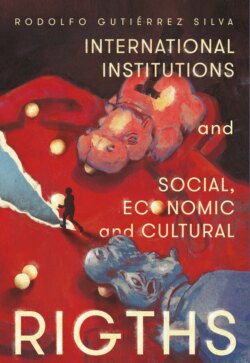Читать книгу International Institutions and social, economic and cultural rights - Rodolfo Gutiérrez Silva - Страница 3
На сайте Литреса книга снята с продажи.
ОглавлениеAbstract
In recent years we have witnessed a great increase in knowledge and technology worldwide which is available to all. However, despite this progress, we still have the same International Institutions and mechanisms that we designed after the Second World War. These institutions are characterized by fragmentation, structural dysfunctions such as corruption, lack of resources, and a lack of institutional capacity. The aim of this book is to evaluate the challenges facing International Institutions in the protection of Economic, Social, and Cultural Rights. More specifically, it seeks to detect different patterns in two types of actors that include international financial institutions and institutions of the universal system, such as the United Nations Refugee Agency. The methodology includes a design of comparative documentary research and case study evaluation. This includes an evaluation of several cases that analyse the role of International Institutions and their interaction with human rights. Trying to find common patterns in different structures and processes gives us some indication, an image of the type of problems these institutions currently face. The cases studied in this research reveal a series of challenges international institutions are facing that range from strengthening organizational and strategic aspects to overall strengthening institutional capacity. However, the main challenge encountered is the development of intentional institutional reflexivity. This implies the adoption, by international institutions, of a new orientation to principles and values. The promotion of this new approach must start with a complete restructuration at the world level.
Keywords: economic, social and cultural rights; international institutions; institutional capacity; institutional reflexivity.
How to cite this book?
¿Cómo citar este libro?
Gutiérrez Silva, R. (2021). International institutions and social, economic, and cultural rights. Ediciones Universidad Cooperativa de Colombia. Doi: https://doi.org/10.16925/9789587602760
Resumen
En los últimos años hemos sido testigos de un gran incremento en el conocimiento y tecnología a nivel mundial que está disponible para todos. Sin embargo, pese a este avance, seguimos teniendo las mismas instituciones y mecanismos internacionales que diseñamos luego de la segunda guerra mundial. Dichas instituciones se caracterizan por su fragmentación, disfunciones estructurales como la corrupción, falta de recursos y por una falta de capacidad institucional. El objetivo de este libro es evaluar los desafíos que enfrentan las instituciones internacionales en la protección de los derechos económicos, sociales y culturales. Más específicamente, busca detectar diferentes patrones en dos tipos de actores que incluyen las instituciones financieras internacionales y las instituciones del sistema universal, como la Agencia de la Organización de las Naciones Unidas para los Refugiados. La metodología incluye un diseño de investigación documental comparativo y la evaluación de estudio de casos. Esto incluye una evaluación de varios casos que analizan el papel de las instituciones internacionales y su interacción con los derechos humanos. Intentar encontrar patrones comunes en diferentes estructuras y procesos nos da alguna indicación, una imagen del tipo de problemas que estas instituciones enfrentan actualmente. Los casos estudiados en esta investigación revelan una serie de desafíos que enfrentan dichas instituciones que van desde el fortalecimiento de aspectos organizacionales y estratégicos hasta, en general, el fortalecimiento de la capacidad institucional. Sin embargo, el principal desafío encontrado es el desarrollo de la reflexividad institucional intencional. Esto implica la adopción, por parte de las instituciones internacionales, de una nueva orientación hacia principios y valores. La promoción de este nuevo enfoque debe comenzar con una reestructuración completa a nivel mundial.
Palabras clave: capacidad institucional; derechos económicos, sociales y culturales; instituciones internacionales; reflexividad institucional.
